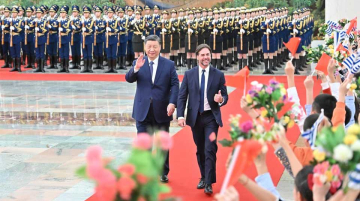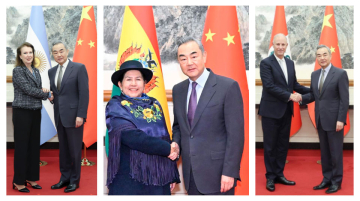
By Alvaro Mendez and Chris Alden
The negotiations for the EU-Mercosur Free Trade Agreement (FTA) have spanned over two decades and are now facing renewed delays. This prolonged process is a crucial moment in Latin America’s trade policy, especially as Brazilian President Luiz Inácio Lula da Silva had been eager to finalize the deal during his country’s recent pro tempore presidency of Mercosur, a group comprising Argentina, Brazil, Paraguay, and Uruguay. The EU’s stalled efforts contrast sharply with the developing situation in the region, particularly China’s growing interest in establishing a trade agreement with the bloc.
Beijing’s strategic attention towards Mercosur, especially in light of its potential influence on Paraguay, the last South American country maintaining diplomatic ties with Taipei, adds intricacy to the eventual negotiations. This factor becomes even more significant with Asuncion taking over the bloc’s presidency from Brasilia. Meanwhile, Uruguay’s pursuit of a bilateral FTA with China, breaking away from the bloc’s tradition of collective bargaining, not only highlights Montevideo’s ambitious diplomatic strategy but also signals possible internal divisions within the group.
In this changing environment, Brazil’s foreign policy under President Lula exemplifies a common trend in Latin America’s dealings with global powers. Characterized by his extensive international travels and audacious initiatives, such as the “peace club” proposal for Ukraine, Lula’s leadership reflects a regional inclination toward strengthening international ties, with a notable focus on China. However, this approach, ostensibly aimed at reasserting Brazil and its neighbors internationally, often seems more driven by unchecked enthusiasm than a well-crafted plan. The rhetoric of “Brazil is back,” along with similar assertions from other countries in the region, underscores a strong desire for increased global presence. Yet, it also reveals a potential shortfall in grasping the complexities of the challenging geopolitical landscape.
Brazil’s case, although important, is just one part of the broader scenario of international relations in the region. The challenges and goals of smaller states in Mercosur, like Uruguay and Paraguay, highlight both the complexities of diplomacy and shortcomings of international relations, which focuses too much on the actions of larger countries.
In this intricate international scene, it’s clear that the region needs a thoughtful and nuanced approach to diplomacy. Latin American nations must align their global objectives with the practical aspects of diplomacy. Achieving this equilibrium is crucial for establishing a sustainable and effective role in the global arena while adapting national tactics to the region’s actual needs and circumstances, and avoiding overstretching in diplomatic efforts.
Alvaro Mendez and Chris Alden are co-authors of China and Latin America: Development, Agency and Geopolitics (Bloomsbury 2023).








